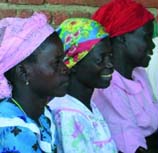MACRO-LEVEL aggregate statistics often do not show crucial differences within a population. Sex-differentiated information is often insufficiently available in national and international databases. Existing databases are often not well developed and updated, and information is scattered, anecdotal and conflicting. Women's work in agriculture is largely unreported and underestimated in population censuses and labour force surveys. Gender sensitive indicators should be designed to demonstrate changes in relations between men and women in a given society over a period of time, and used to assess progress in achieving gender equality by measuring changes in the status of women overtime.

|
ASSETS AND LIVELIHOOD STRATEGIES FAO in close collaboration with Development Cooperation Ireland (DCI) and the Government of Zambia completed household livelihood research among 740 households. The Gender Inequality and Rural Livelihoods Report includes qualitative and quantitative information on macro-factors influencing livelihoods, asset dynamics, household livelihood strategies and livelihood outcomes for different household categories affected by HIV/AIDS. Source: FAO, 2004c. |